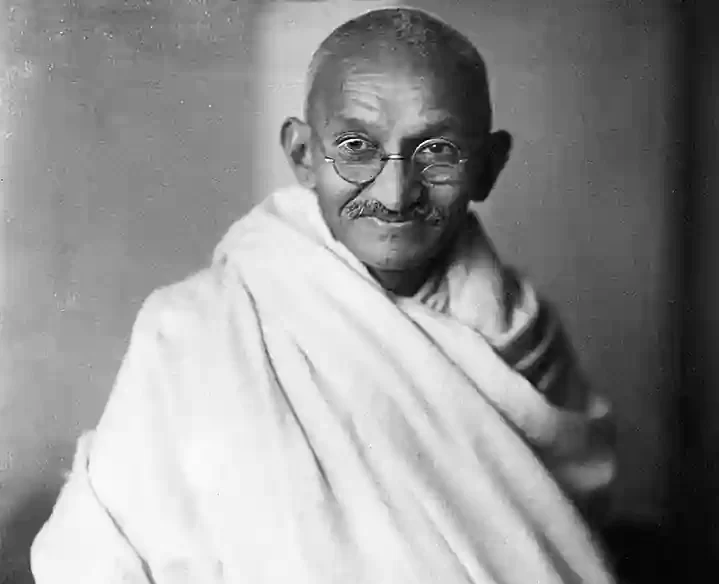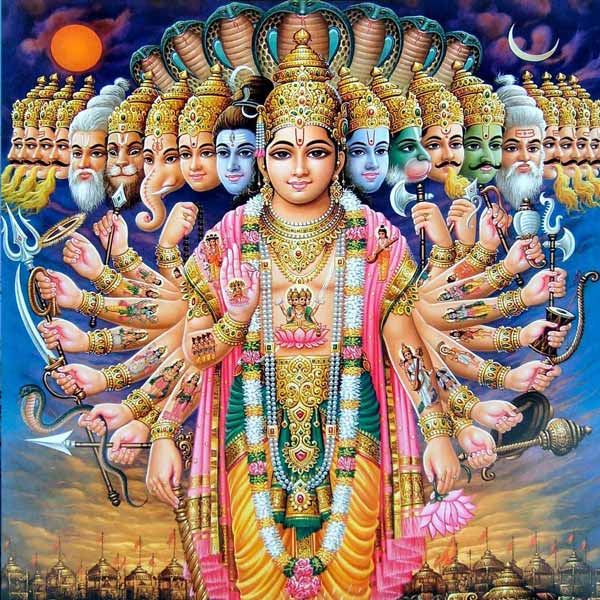What is Gandhian philosophy?
Gandhian philosophy is the religious and social ideas adopted and developed by Gandhi, first during his period in South Africa from 1893 to 1914, and later in India.
- Gandhian philosophy is not only simultaneously political, moral, and religious, it is also traditional and modern, simple and complex.
- It embodies numerous Western influences to which Gandhiji was exposed, but is rooted in ancient Indian culture harnessing universal moral & religious principles.
- Gandhian Philosophy emphasizes not utopian idealism, but practical idealism.
- Gandhian philosophy is a double-edged weapon. Its objective is to transform the individual and society simultaneously, in accordance with the principles of truth and non-violence.
- Gandhiji developed these ideologies from various inspirational sources vis Bhagvad Geeta, Jainism, Buddhism, Bible, Gopal Krishna Gokhale, Tolstoy, John Ruskin among others.
- Tolstoy’s book ‘The Kingdom of God is within you’ had a deep influence on Mahatma Gandhi.
- Gandhiji paraphrased Ruskin’s book ‘Unto this Last’ as ‘Sarvodaya’.
- These ideas have been further developed by later “Gandhians”, most notably, in India by, Vinoba Bhave and Jayaprakash Narayan and outside of India by Martin Luther King Jr. and others.
Major Gandhian Philosophy
Truth and Non Violence
These are generally considered to be the two key ingredients of Gandhian thought.
It is possible to pursue one without the other. Thus, seeking the truth can be done violently. Nations enter conflicts assuming they are on the side of truth or that the truth is on their side.
Those who are more sensitive and think the truth is on their side demand that a just war should be fought instead of one that is avoided at all costs. The most sensitive were the pacifists among them. By avoiding violence altogether. But it could be argued that in doing so they have gone too far and abandoned truth, especially when interpreted as justice.
Even Mahatma Gandhi argued that although he was opposed to war, the two parties engaging in it may not stand on the same plane: the cause of one side could be more just than the other so that even a nonviolent person might wish to extend his or her moral support to one side rather than to the other.
Thus just as it is possible to pursue truth without being nonviolent, it is also possible to pursue nonviolence without pursuing truth.
It could be proposed that such a disjunction between the two runs the risk of cowardice being mistaken for, or masquerading as nonviolence.
The point becomes clear if we take the word “truth” to denote the “right” thing to do in a morally charged situation.
GANDHI’S OPINION ON THE NON-VIOLENT WAY
By using a non-violent approach, we aim to eliminate capitalism, not the capitalist. We encourage the investor to think of himself as a trustee for people who rely on him to create, hold onto, and grow his capital.
Work is power if money is. Both are depending upon one another.
The moment the worker recognizes his potential, he is in a position to stop being the capitalist’s slave and start sharing in his success. If he aims at becoming the sole owner, he will most likely be killing the goose that lays the golden eggs.
Satyagraha
Gandhi ji called his overall method of nonviolent action Satyagraha. It means the exercise of the purest soul force against all injustice, oppression and exploitation.
It is a method of securing rights by personal suffering and not inflicting injury on others.
The origin of Satyagraha can be found in the Upanishads, and in the teachings of Buddha, Mahavira and a number of other greats including Tolstoy and Ruskin.
Gandhi’s Satyagraha became a major tool in the Indian struggle against British imperialism and has since been adopted by protest groups in other countries.
The ancient Indian philosophy of ahimsa, or “non-injury,” which is rigorously practiced by Jains, many of whom reside in Gujarat, where Gandhi was raised, is the inspiration behind Satyagraha.
Gandhi first conceived Satyagraha in 1906 in response to a law discriminating against Asians that was passed by the British colonial government of the Transvaal in South Africa.
In 1917, the Champaran district, which produced indigo, hosted the first Satyagraha campaign in India. Fasting and economic boycotts were used as Satyagraha tactics in India over the ensuing years, up until the British left in 1947.
Since Satyagraha depends on the opponent, who is the embodiment of evil, upholding a high standard of ethical conduct, and demands an unreasonably high level of commitment from those working for social change, critics of the movement have asserted that it is unrealistic and incapable of achieving universal success.
These arguments have been made both during Gandhi’s lifetime and since.
However, Satyagraha left a lasting legacy in South Asia and was a key component of the civil rights movement headed by Martin Luther King Jr. in the United States.
Sarvodaya
The word “Sarvodaya” means “Universal Uplift” or “Progress of All.” The phrase was first used by Mohandas Gandhi to describe the aim of his political philosophy in his 1908 translation of “Unto This Last,” a work by John Ruskin on political economy.
Later Gandhians adopted the phrase as a moniker for the social movement in post-independence India that worked to ensure that self-determination and equality reached all strata of Indian society, including the Indian nonviolence leader Vinoba Bhave.
OBJECTS OF THE SARVODAYA MOVEMENT
The Sarvodaya Movement has as its target the establishment of a whole network of such self-supporting village communities.
Family ties, which are currently restricted to blood groups, will be extended to include the entire village, erasing any disparities based on race, creed, caste, language, and other factors.
The planning of agriculture will ensure that there is enough food for everyone. Up until everyone in the hamlet has a job, the industry will operate on a cottage basis.
Village Council, a body that represents the entire village, will be responsible for determining the requirements of the community.
PRINCIPLES OF THE SARVODAYA
- There is no centralized authority, and there is a political and economic atmosphere in the villages.
- The spirit of love, fraternity, truth, nonviolence, and self-sacrifice will permeate all people. The foundation of society will be nonviolence.
- There will be no party system and majority rule and society will be free from the evil of the tyranny of the majority.
- Socialist in the truest sense, the Sarvodaya society. The same ethical, social, and financial standards will apply to all calls. The greatest potential for development exists within each person’s personality.
- Sarvodaya society is based on equality and liberty. There is no room in it for unwholesome competition, exploitation, and class hatred.
- Sarvodaya is a symbol of universal progress. Every person should work independently and adhere to the concept of non-possession.
- There won’t be any private property, which serves as a weapon of exploitation and a breeding ground for prejudice and hatred. Similar to how the profit motive will vanish, rent and interest will also disappear.
- The Sarvodaya Movement is based on Truth, nonviolence, and Self-denial.
- The Sarvodaya Movement makes an earnest and audacious effort to foster the environment required to unite such people with steadfast trust in the Welfare of All.
- The benefit to the person would be little. Each quality’s growth is dependent on every other quality. If every quality were somewhat enhanced, the person would benefit more.
Swaraj
Although the word swaraj means self-rule, Gandhi ji gave it the content of an integral revolution that encompasses all spheres of life.
For Gandhi ji, swaraj of people meant the sum total of the swaraj (self-rule) of individuals and so he clarified that for him swaraj meant freedom for the meanest of his countrymen. And in its fullest sense, swaraj is much more than freedom from all restraints, it is self-rule, self-restraint and could be equated with moksha or salvation.
Trusteeship
Trusteeship is a socio-economic philosophy that was propounded by Gandhi ji.
It provides a means by which the wealthy people would be the trustees of trusts that looked after the welfare of the people in general.
This principle reflects Gandhi ji’s spiritual development, which he owed partly to his deep involvement with and the study of theosophical literature and the Bhagavad Gita.
The idea was taken from English law by Gandhi. It denotes that one is a trustee rather than the owner of their belongings, including eventually their skills or abilities.
All must be used for the greater good of society, which includes one’s own welfare in the end. In this system, material possessions do not serve as status symbols that increase our sense of self-worth.
Trusteeship is a successful strategy for reducing excessive consumption. The economy might be rebalanced under trusteeship and put its focus back on pressing needs.
Gandhi believed that possessing more than one need necessarily entails robbing others of their requirements. There is enough on the earth to meet everyone’s needs, but not enough to satisfy everyone’s greed, he said.
Swadeshi
The combination of two Sanskrit terms yields the English word “Swadeshi,” which has Sanskrit roots. Swa and desh both refer to one’s own or one’s nation.
Swadesh, therefore, refers to one’s homeland. The adjectival version of the word swadeshi, which means “of one’s own country,” can be loosely translated as “self-sufficiency” in most settings.
Swadeshi is the focus on acting within and from one’s own community, both politically and economically.
It is the interdependence of community and self-sufficiency.
Gandhi ji believed this would lead to independence (swaraj), as British control of India was rooted in control of her indigenous industries. Swadeshi was the key to the independence of India, and was represented by the charkha or the spinning wheel, the “center of the solar system” of Mahatma Gandhi’s constructive program.
THE MESSAGE OF THE CHARKHA
Gandhiji asserts that the Charkha has the distinction of being able to address the issue of economic distress in a way that is most logical, straightforward, affordable, and professional.
It stands for both the wealth and freedom of the country. It represents commercial peace rather than commercial strife.
The spinning-meaning wheel is considerably bigger than its diameter. Simple life, helping others, living without hurting others, and forging an unbreakable tie between the wealthy and the poor, capital and labour, and the prince and the peasant are all part of its teachings. Naturally, the bigger lesson applies to everyone.

The Relevance of Gandhian Philosophy in Modern Times
Economics
- Make in India is a manifestation of Gandhi’s ideals of self-sufficiency.
- Gandhi’s philosophy of inclusive growth is fundamental to the building of a resurgent rural India.
- He believed in “production by the masses” rather than in mass production, a distinctive feature of the industrial revolution.
Environment
- Gandhi warned the country of unrestricted industrialism and exploitation of nature for human greed.
- The results of not adhering to Gandhian environmentalism are serious environmental damage and non-sustainable development.
Administration
- By emulating Gandhi’s values of non-violence and Satyagraha, internal matters such as insurgency issues in Kashmir, central India, or the North-Eastern states might be handled much better.
International
- Even India’s foreign policy is founded on peaceful coexistence, and this is seen in the fact that India does not engage in aggression initially, even when security threats mount.
Seven Social Sins by Mahatma Gandhi
Seven Social Sins by Mahatma Gandhi were first published in his newspaper Young India in 1925. Those are a comprehensive list of behaviours that cause serious harm to society.
- Wealth without Work: It depicts making wealth by unfair means, by taking shortcuts. Examples: Black Money, Tax evasion, scams, insider trading, etc.
- Pleasure without Conscience: Earning happiness at the expense of others is equivalent to sin. Selfishness compels a person to disregard the needs of others. Without moral justification, it would promote bad practices. Additionally, it would lead to a rise in drug and alcohol abuse as well as mindless shopping.
- Knowledge without character: A person with character possesses attributes of honesty and integrity. A person who commits this vice may end up like Osama Bin Laden, while a person with moral character may end up like Swami Vivekananda.
- Business without morality: One particular segment of the community would end up being overworked at the expense of another. Social friction and community conflict would rise as a result of this. Examples of this sin include unsafe working conditions, adulteration, and lack of security.
- Science without humanity: The huge pharmaceutical companies keep prescription prices high, making them unaffordable for the poor and those in need. If nuclear power is utilized to generate electricity, that is great, but using it to destroy nations like Hiroshima and Nagasaki by bombing is utterly immoral.
- Religion without sacrifice: Today’s religion consists merely of rituals and activities. Sin is when we fail to live out the moral precepts of brotherhood, compassion, and affection.
- Politics without principle: Criminalization of politics, unaccounted money, and use of muscle power shows politics without principle.
Conclusion
Gandhian ideologies shaped the creation of institutions and practices where the voice and perspective of everyone can be articulated, tested and transformed.
According to him, democracy provided the weak with the same chance as the strong.
Functioning on the basis of voluntary cooperation and dignified & peaceful co-existence was replicated in several other modern democracies. Also, his emphasis on political tolerance and religious pluralism holds relevance in contemporary Indian politics.
Truth, nonviolence, Sarvodaya and Satyagraha and their significance constitute Gandhian philosophy and are the four pillars of Gandhian thought.
- Download the pdf of Important MCQs From the History Of Ancient India
- List Of Important Inscriptions In India







